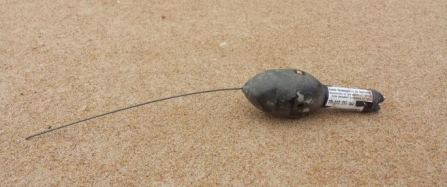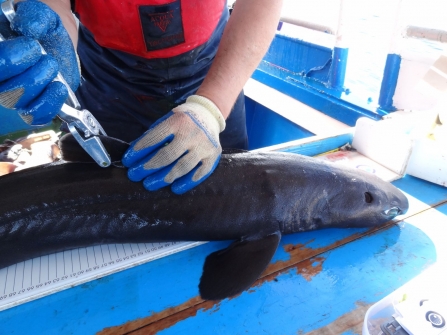
The satellite tag by Cristina Rodriguez Cabello

The satellite tag by Cristina Rodriguez Cabello
At the beginning of June, a member of the public stumbled upon an unusual find lying amongst the seaweed on Cape Cornwall. On presenting it to marine experts at the Trust, it was discovered that it was in fact a wildlife satellite tag, used on animals to discover more about their ecology and behaviour in the wild. Using the international phone number provided on the side of the tag, clumsy conversations in broken Spanish lead to the discovery that this tag had been placed on a deep water shark over four years previously off the coast of Spain near Santander.
Abby Crosby, Marine Conservation Officer for Cornwall Wildlife Trust, says
“Finding something as exciting as a deep water shark satellite tag which can uncover the secrets of the deep is like a dream come true for any marine biologist or enthusiast. We know so little about the ocean and the species which live in them particularly in the ocean depths, so I knew immediately that this tag was valuable not only in cost but in the data that it held and that the scientist who deployed it would want to have back."

Tagging the sharks, photo by Cristina Rodriguez Cabello
The electronic tag belongs to a project at the Oceanographic Centre of Santander in northern Spain, financed by the National Program of Research (2011-2016) and named DEEPCON. The main objective of DEEPCON project was to study the connectivity between deep-water marine areas based on shark populations.
The sharks investigated during this research were the leafscale gulper shark, and the Portuguese dogfish, due to these species being extremely vulnerable to fishing exploitation and other anthropogenic threats. The sharks were tagged on board fishing boats, which sailed from a village called San Vicente de la Barquera in north Spain. The tag found here in Cornwall was attached to a leafscale gulper shark (Centrophorus squamosus) on the 13 June of 2013. It was fixed on a male of 118 cm total length and programmed to release after 90 days. It worked and detached from the shark on 13 September 2013. Once on the surface it started to send data via satellites to the scientists. What was discovered was that the shark had traveled at least 548 nautical miles in a straight line from its origin point. This was an incredible finding, a first for this species, giving important evidence for the first time that this animal could travel such long distances. It also showed the shark lived between 800 and 14000 meters - an inhabitable depth for most species with darkness and immense pressure.
Abby Crosby continues,
“Since 13th September 2013, after nearly four years of floating in the ocean, it arrived at Cape Cornwall here in Cornwall, and by pure chance it was picked up by a member of the public, making it quite an amazing story. You never know what you will find when out walking on our Cornish beaches, and if this doesn’t motivate you to explore our wonderful coastline I am not sure what will!”
About 57 % of the data recorded was received by satellite from the tag back in 2013 until the battery ran out. Now that the marine biologists have recovered the tag there is a chance that the full dataset will be downloaded to tell us more about this fascinating creatures, however after 4 years at sea it was a little damaged. Either way, superb results have been gathered already to giving us an invaluable insight into the ecology of these elusive animals.